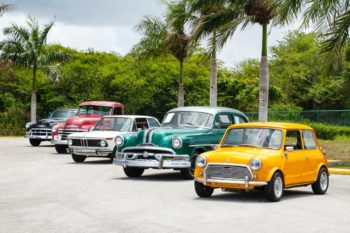French Vehicles Posted by Tim Hildreth on Oct 26, 2021 in Vocabulary
I’ve written about transportation before … and I’ve also written about the efforts that cities like Paris are making to reduce their presence in their midst, but I realized recently that I’ve never done a review of basic French vocabulary for les véhicules.
French vehicles
| Les véhicules | Vehicles |
| Les véhicules à deux roues | Two-wheeled vehicles |
| La bicyclette | Bicycle |
| Le vélo | Bicycle |
| La moto | Motorcycle |
| La mobylette | Moped/scooter |
| Les véhicules à quatre roues | Four-wheeled vehicles |
| La voiture | Car |
| Le camion | Truck |
| Le monospace | Minivan |
| Le fourgon | Box truck |
| Le taxi (l’Uber) | Taxi (Uber) |
| Les transports en commun | Public transportation |
| L’autobus / le bus | City/urban bus |
| L’autocar / le car | Tour bus |
| Les engins agricoles | Farm/agricultural vehicles |
| Le tracteur | Tractor |
| La moissonneuse-batteuse | Combine |
| Les véhicules officiels | Official vehicles |
| La voiture de police | Police car |
| Le camion des pompiers | Fire truck |
| L’ambulance | Ambulance |
Exploring les vehicules
Vélo ou bicyclette: While the words vélo and bicyclette are synonyms, the research of these authors shows that the word vélo tends to be associated with more sporting and serious contexts while the word bicyclette is more often related to a more pedestrian context (no pun intended!). In my own personal experience, vélo is more common in general vernacular, but this Google Ngram analysis of word usage in books gives the lead to bicyclette!
Autobus ou autocar: This article from the European tour operator Groupito does a nice job outlining the differences between un bus (short for autobus) and un car (short for autocar). Un bus est “un véhicule spécialisé dans le transport urbain à vitesse réduite, sur des trajets définis, et avec des arrêts fréquents. Les passagers peuvent d’ailleurs voyager debout. Par exemple, pour vous rendre de la maison à l’école du village, vous prendrez un autobus”.1A bus is “a vehicle designed for urban transport at reduced speeds, over a defined route, and with frequent stops. Passengers can travel standing up. For example, you would take a bus to go from your house to the village school.
Un autocar (ou un car) “est un véhicule permettant des transports interurbains ou des trajets longue distance comme des voyages touristiques”2A car is a vehicle for intercity trips and long distance voyages like tour groups.
Les voitures françaises: France has three main car companies that may be familiar to you. The oldest is Peugeot who released their first car in 1889, followed in 1898 by Renault, and then finally Citroën whose DS3The letters DS in French are pronounced like the French word déesse / goddess. car line eventually evolved into its own brand. You can read more about these brands (and France’s super car brand Bugatti and youngest car company Alpine) here.
Here’s a little video to help you practice some of your new vocabulary. Kids videos can be a great way to review.
And if that’s not your speed, perhaps you’ll enjoy this song.
- 1A bus is “a vehicle designed for urban transport at reduced speeds, over a defined route, and with frequent stops. Passengers can travel standing up. For example, you would take a bus to go from your house to the village school.
- 2A car is a vehicle for intercity trips and long distance voyages like tour groups
- 3The letters DS in French are pronounced like the French word déesse / goddess.

Build vocabulary, practice pronunciation, and more with Transparent Language Online. Available anytime, anywhere, on any device.





Comments:
tony:
Le parc automobile…
Tim Hildreth:
@tony Merci, Tony. That’s a new term for me. According to my sources ‘le parc automobile’ refers to a fleet of vehicles (https://www.linguee.fr/francais-anglais/traduction/parc+automobile.html) or to the ensemble of all vehicles in France (https://fr.m.wikipedia.org/wiki/Parc_automobile_fran%C3%A7ais) … not to be confused, of course, with ‘un parc de stationnement’ (parking lot).